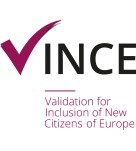Interpret association: community interpreters: this CS relates in a narrative form a successful experience of RPL outcomes and a new qualification scheme for interpreting services in the healthcare, educational and social work sectors, in a context where these services have to deal with communities speaking many languages. The CS first describes the (bottom-up) partnership approach for the construction of a qualification and different qualifying paths suitable for experienced / newer volunteer intercultural interpreters; it then analyses the results of this approach, outlining the various stages applicants have to go through to have their competences assessed (own language and “local” language). It highlights the delicate tasks of assessing “soft” competences” in a context where intercultural misunderstandings can easily occur. It reflects on the fact that the initial creation of a basic certificate (later integrated within the Federal certification system) by an AE Association has given visibility to the need for professional interpreting, thus creating a greater demand; in turn by getting an official qualification immigrants gain a better chance to integrate the labour market in this, and other, areas. Finally it gives a conclusive evaluation, mentioning the importance of transparency for the qualification, of the partnership approach and of the use of the same experts across the processes, of the creation of cost effective on-line tools, concluding that this CS could be used as a model for the recognition of prior learning outcomes in the volunteering sector.

Download:


